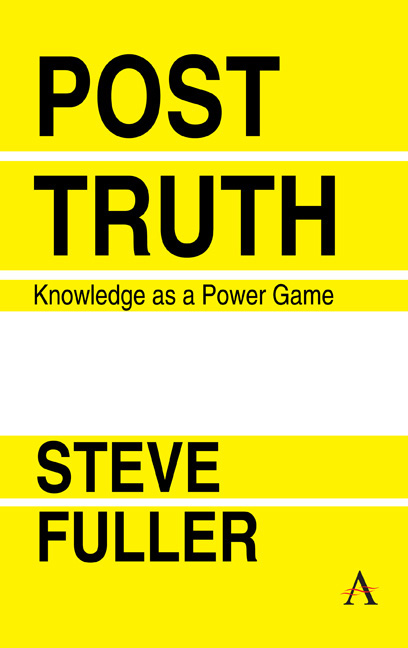Book contents
- Frontmatter
- Dedication
- Contents
- Acknowledgements
- Introduction: Science and Politics in a Post-Truth Era: Pareto's Hidden Hand
- 1 Brexit: Political Expertise Confronts the Will of the People
- 2 What Philosophy Does and Does Not Teach Us about the Post-Truth Condition
- 3 Sociology and Science and Technology Studies as Post-Truth Sciences
- 4 The Post-Truth about Academia: Undiscovered Public Knowledge
- 5 Science Customization: A Project for the Post-Truth Condition
- 6 The Performance of Politics and Science on the Playing Field of Time
- 7 Forecasting: The Future as the Post-Truth Playground
- The Argument in a Nutshell
- Glossary
- References
- Index
4 - The Post-Truth about Academia: Undiscovered Public Knowledge
Published online by Cambridge University Press: 14 July 2018
- Frontmatter
- Dedication
- Contents
- Acknowledgements
- Introduction: Science and Politics in a Post-Truth Era: Pareto's Hidden Hand
- 1 Brexit: Political Expertise Confronts the Will of the People
- 2 What Philosophy Does and Does Not Teach Us about the Post-Truth Condition
- 3 Sociology and Science and Technology Studies as Post-Truth Sciences
- 4 The Post-Truth about Academia: Undiscovered Public Knowledge
- 5 Science Customization: A Project for the Post-Truth Condition
- 6 The Performance of Politics and Science on the Playing Field of Time
- 7 Forecasting: The Future as the Post-Truth Playground
- The Argument in a Nutshell
- Glossary
- References
- Index
Summary
Introduction: Academia's Epistemic Shortfalls and Entitlement Pretensions
‘Academic freedom’ may be the pursuit of truth wherever it may lead, but it is not obvious that left to their own devices academics will necessarily explore, let alone exploit, all that is knowable to the fullest extent. Put more provocatively, the university is inclined to compromise its own liberal universalism, unless it is compelled by external forces to alter its default patterns of behaviour. Perhaps the two most historically important countervailing forces to the university's tendency to compromise – the external drivers of academic universalism, as it were – came together in the twentieth century in what US President Dwight Eisenhower called, albeit with pejorative intent, ‘the military- industrial complex’. The bulk of this chapter deals with this matter.
But right at the outset, my claim is both controversial and counterintuitive. After all, the military and industrial sectors of society are generally portrayed as inhibitors or distorters of pure academic enquiry. However, this depiction is misleading, though it has skewed the narratives that historians have told about the development of the sciences. It has led to a neglect of what US National Science Foundation (NSF) programme officer Donald Stokes (1997) originally called ‘Pasteur's Quadrant’, namely, basic research that is use- inspired – specifically, major intellectual breakthroughs that result from addressing large- scale or long- term practical concerns. The post-truth research agenda dwells here, one which distinctly stands against business as usual in academia.
The phrase ‘Pasteur's Quadrant’ recalls that Louis Pasteur's enduring achievements in what is now called microbiology involved bringing together knowledge from different academic disciplines, typically by challenging one or more of their fundamental assumptions. As witnessed in Pasteur's lifelong ‘Franco- Prussian’ rivalry with Robert Koch, his efforts were in aid of solving major practical problems relating to the national interest in commerce and war. To be sure, these efforts are claimed by academia today as having been ‘biomedical’ in nature. Here the normative term ‘disease’ serves as a pivot to convert Pasteur's achievements from ‘applied’ to ‘basic’ research, and his original attempts to stop bacteria from destroying the silk, milk, wine and beer industries or killing troops in the field are seen as proper ‘scientific discoveries’ in the disciplines of biology and medicine.
Notwithstanding the academic co- optation of Pasteur's work, Stokes's original insight stands.
- Type
- Chapter
- Information
- Post-TruthKnowledge as a Power Game, pp. 69 - 106Publisher: Anthem PressPrint publication year: 2018

